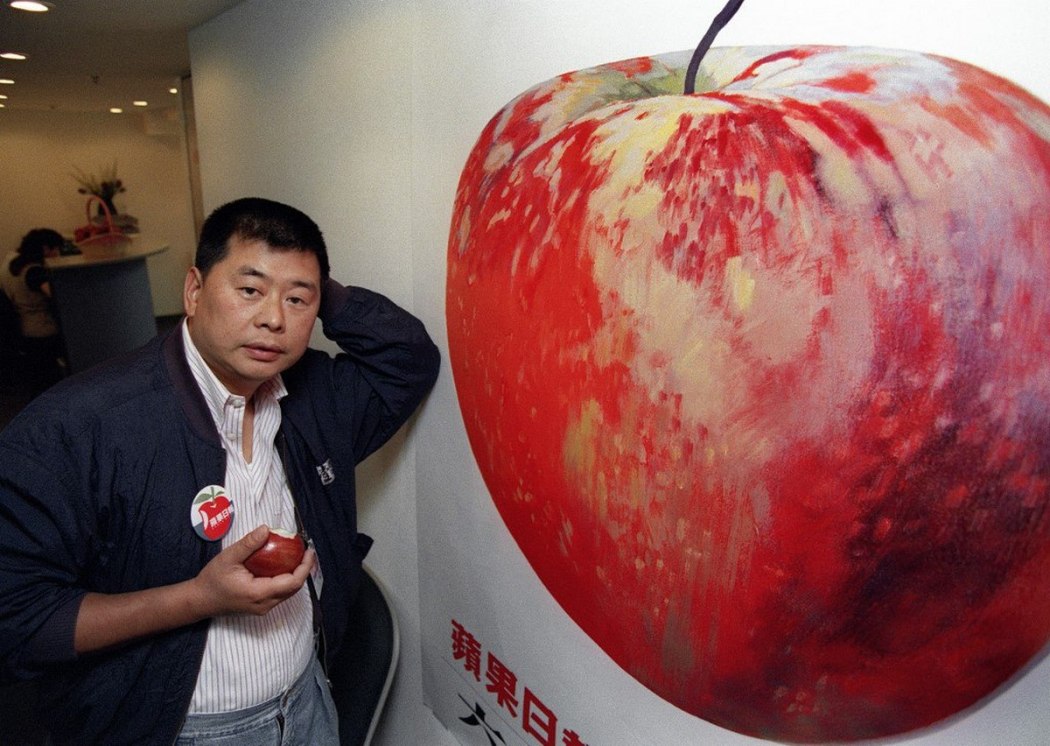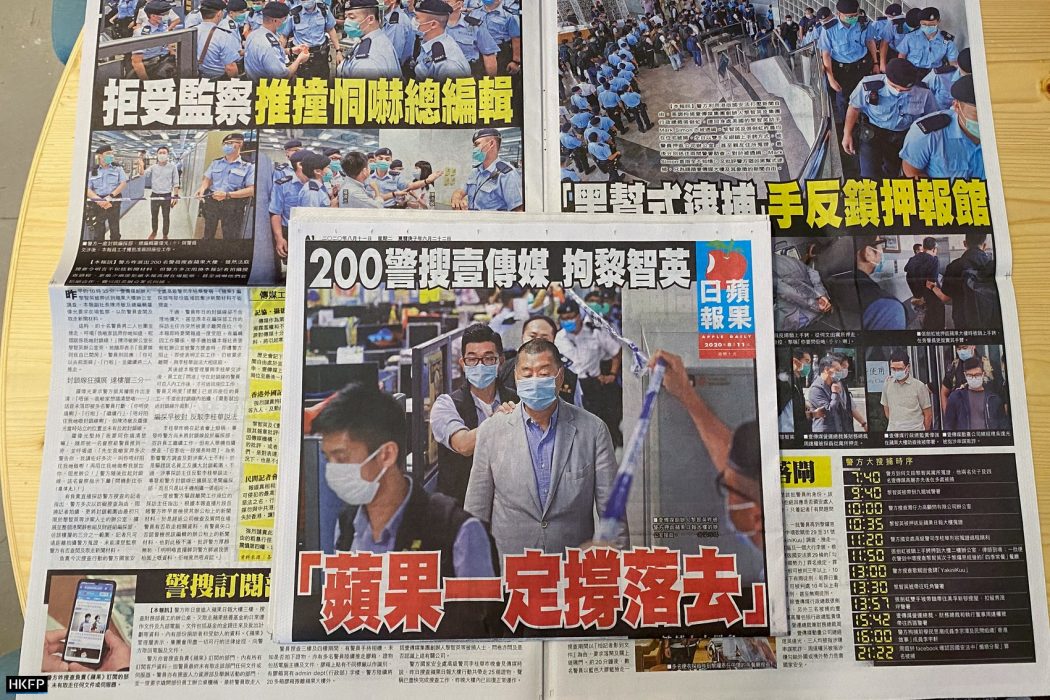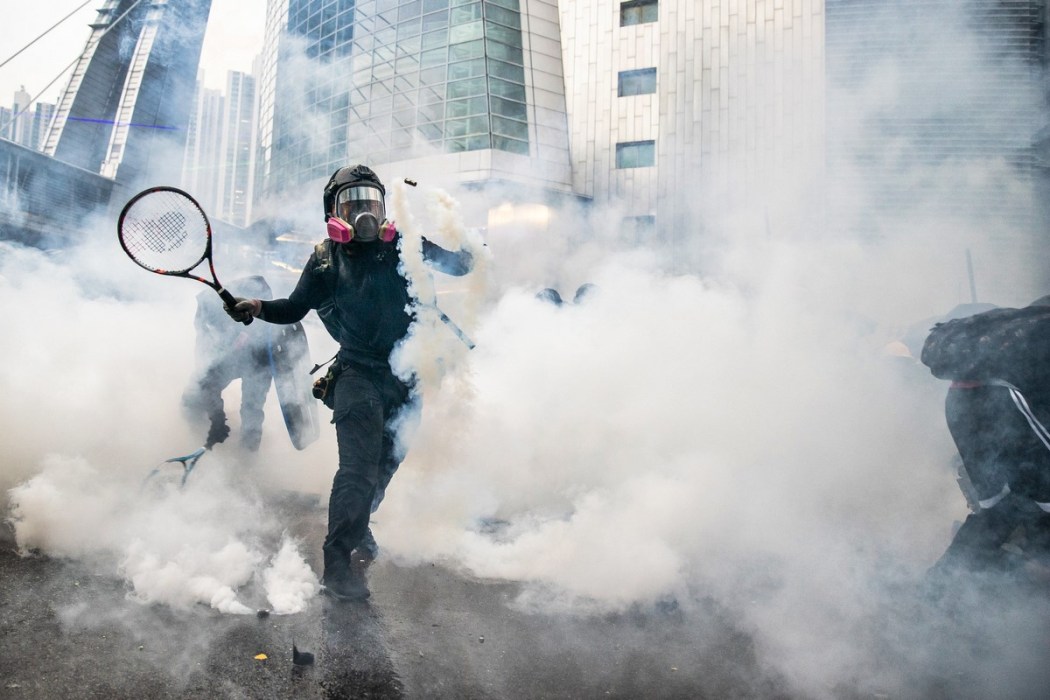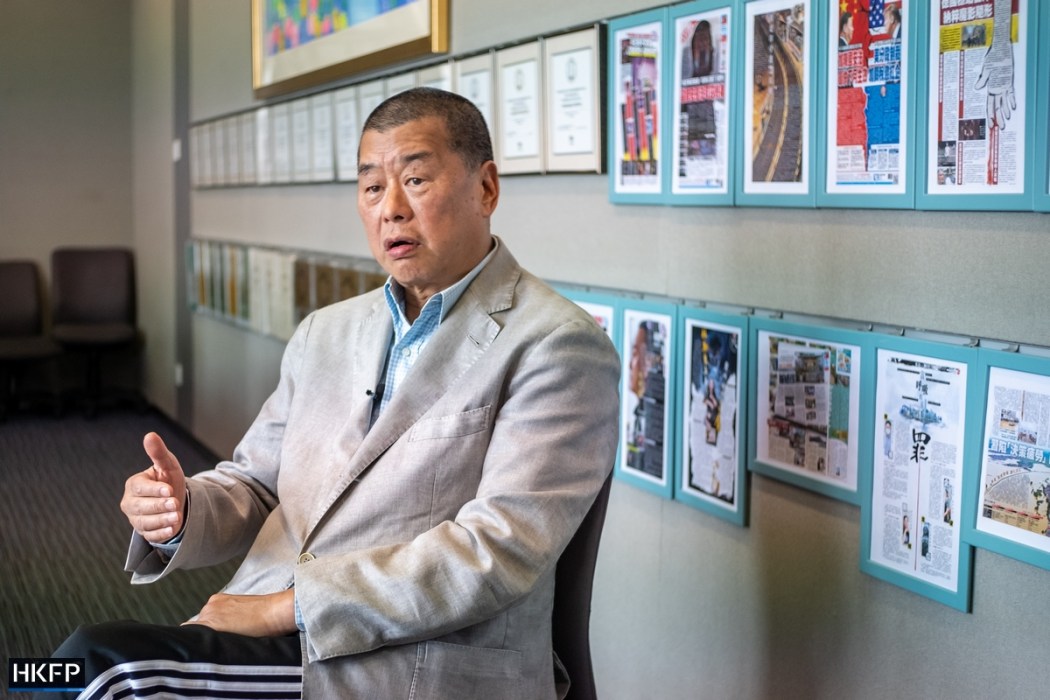Pro-democracy media mogul Jimmy Lai says he is prepared to sacrifice anything for Hong Kong and his embattled newspaper Apple Daily will keep speaking out under the Beijing-imposed national security law, but it will steer clear of protest activism.

The paper, he said, would keep going until the day its operation is no longer possible, and would then close. “Compromise is not what we established this company for,” the Next Digital owner told HKFP in an interview.
Lai is the highest-profile figure to be held under the national security law since the legislation was imposed on the city on June 30. His arrest and the subsequent raid made headlines worldwide.
The 72-year-old former apparel magnate, who is on bail pending a hearing on the security law, also faces a plethora of charges under the regular criminal code. He spoke to HKFP last Friday morning, less than a day after being cleared of criminal intimidation against a reporter from rival publication Oriental Daily in June 2017.

Lai said he was glad that the magistrate who heard his case was “not politicised,” but the acquittal had not restored his faith that the city’s rule of law would extend to other criminal cases he is entangled in.
He is among 13 democrats and public figures accused of incitement in connection with a banned vigil commemorating the 1989 Tiananmen Massacre on June 4th. He also faces multiple charges over last year’s pro-democracy protests which were triggered by a now-withdrawn extradition bill.
Yet none of these cases attracted more international media attention than his arrest under the controversial security legislation last month, for allegedly colluding with foreign forces. Over 200 police officers raided the newsroom to gather evidence, and Lai’s two sons and several senior executives of the media company were rounded up as well.
Speaking to HKFP at the Apple Daily headquarters, Lai said the arrests and the raid – decried by critics as a “direct assault” on the city’s press freedom – had made his staff more determined than ever to do their job.
“They were agitated and angry,” he said.
The tabloid owner described the publication he founded in 1995 as pro-freedom and the “only voice in town” that is unapologetically critical of the local and central governments. He said employees shared the same “westernised values,” as evidenced by cubicle walls covered with pro-democracy posters and Apple Daily reports of events during the protests.

The office also has its own “Lennon Wall” – a type of message board which demonstrators used to show support for the movement. It features anti-police slogans and headshots of Chief Executive Carrie Lam next to memo notes reading “Leave a name that will stink for eternity.”
“From day one, we have been like this. We never changed and we won’t change,” Lai said, adding that the newspaper remains undeterred by the uncertainties surrounding the sweeping legislation that also criminalises secession, subversion and interference with transportation and other infrastructure.

But he admitted that Apple Daily must now be more cautious in what it publishes.
A disclaimer reading “This newspaper does not support Hong Kong independence” was printed at the bottom of a front-page advertisement placed by the Hong Kong University Students’ Union on August 14, while some text was redacted owing to legal concerns.

“We used to have posters to urge people to go out to demonstrations or urge people to memorialise June 4th. I think these kinds of things, we won’t do again,” said Lai, shaking his head.
The rebel tycoon said Apple Daily had never backed independence for Hong Kong, saying such calls would give the Chinese Communist Party (CCP) an excuse to clamp down on the city. Nonetheless, Chinese state media label him part of a new “Gang of Four” bent on colluding with foreigners to ruin Hong Kong – along with veteran democrats Albert Ho and Martin Lee and former chief secretary Anson Chan.

Lai also came under fire for donating millions of dollars to pan-democrats, after transaction records leaked in 2014. The five politicians involved were later cleared following a three-year corruption probe.
Lai has styled himself a “troublemaker” but shrugs off labels by Beijing. “I really don’t care. The only thing I answer to is my conscience and the community here. Even if they have the handcuffs on me, I still feel at peace.”
Asked what he himself was ready to sacrifice if necessary, Lai said: “Whatever comes. I can’t talk specifically because I can’t control it, they control it.”

The self-made millionaire has been on Beijing’s radar for over three decades, after he penned columns lambasting the Chinese military crackdown on the student-led demonstrations in and around Tiananmen Square on June 4th, 1989, which was estimated to have cost hundreds, perhaps thousands, of lives.
In retaliation, the Chinese government began closing down Lai’s Giordano stores on the mainland, forcing him to sell his apparel empire and shift to the publishing industry. He has since become one of the most outspoken critics of Beijing, as well as a high-profile supporter of the city’s democratic movements.
Lai told HKFP he has always advocated peaceful means to strive for democracy and freedom. Violent protest scenes from last year, such as the hurling of petrol bombs and vandalising of metro stations, had crossed the line.

“When the young people broke into the Legislative Council, I thought it was a bit too far. But I must admit that slowly, slowly, I came to accept it because of the police brutality,” said Lai.
Protesters smashed glass doors and windows to storm into the government complex on July 1, 2019, defacing the HKSAR emblem and spray-painting slogans on walls.
Lai said he and other pro-democracy figures had tried to urge protesters to shun violence, including asking visiting US congressmen and senators to echo such advice.
But the leaderless nature of the movement made it almost impossible: “Even if we criticise them and tell them it is the wrong way to do it, we can’t stop them.”

Hongkongers must uphold their “moral authority” when resisting Beijing’s encroachments on the city’s freedoms, Lai said, as protesters could be no match for the mainland authorities in terms of use of force.
“We don’t have guns and tanks like the CCP, we have nothing… time is our weapon, not violence.”
The government has said the enactment of the national security law – which was imposed on the city even before its provisions were revealed – showed the central authorities’ determination to restore stability after a year of escalating violence and “riots”. The city’s leader Lam also said the legislation only targeted a “minority of people” and she did not see widespread fears among Hong Kong people.

Lai described Lam as a Beijing official, saying China has “dictated” her decisions. He said a security law was bound to happen even if last year’s protests had remained peaceful. ” I’m sure the CCP wants to rein us in and shut us up.”
Lai said Hong Kong’s fight for democracy must rely on international support. Following the passing of the security law the US, among other countries, has announced a series of punitive measures including sanctions on government officials and revoking the city’s preferential trade treatment. The local and central governments slammed the measures as “blatant and barbaric interference” in China’s internal affairs.
With the US presidential election less than two months away, Lai said his impression was that Hong Kong would receive greater support under incumbent Donald Trump.

“I think if [Joe] Biden gets elected, he will be on our side also, but not as strong and aggressive as Trump. I think Biden will be more reconciliatory than Trump.”
Lai, who met US Vice-President Mike Pence and Secretary of State Mike Pompeo in Washington in July 2019, said it was a lot more dangerous now to speak to foreign officials under the national security law. But when the time comes that Hong Kong needs the backing of the international community, somebody – he did not know who – must risk it.

The Guangzhou-born businessman, who was smuggled to Hong Kong when he was 12, also reflected on how Hong Kong had changed – from a place offering a better life to a place to flee from.
Several prominent pro-democracy figures including Nathan Law, former leader of the now-disbanded political group Demosisto, left the city as the security law came into force. They are reportedly “wanted” by Hong Kong police for national security offences.
A group of 12 Hongkongers – the youngest just 16 – are also being detained across the border after they tried to flee to Taiwan on a speedboat. Among those arrested was 29-year-old Andy Li, who was apprehended by Hong Kong police under the national security law on the same day as Lai.

“Now people escape from it [Hong Kong], as opposed to people escaping to it from China. That shows to you how draconian the national security law is on Hong Kong. The effect of intimidation in Hong Kong is unparalleled.”
Following the arrest of his two sons, whom Lai said had nothing to do with the operations of Apple Daily, he is ready to send his family members away “when the worst comes to the worst.” But he said he himself would stay in the city.
“At my age, this place has been so wonderful for me. If I give up anything for it, it’s a redemption for me.”
Support HKFP | Policies & Ethics | Error/typo? | Contact Us | Newsletter | Transparency & Annual Report | Apps
Help safeguard press freedom & keep HKFP free for all readers by supporting our team
























